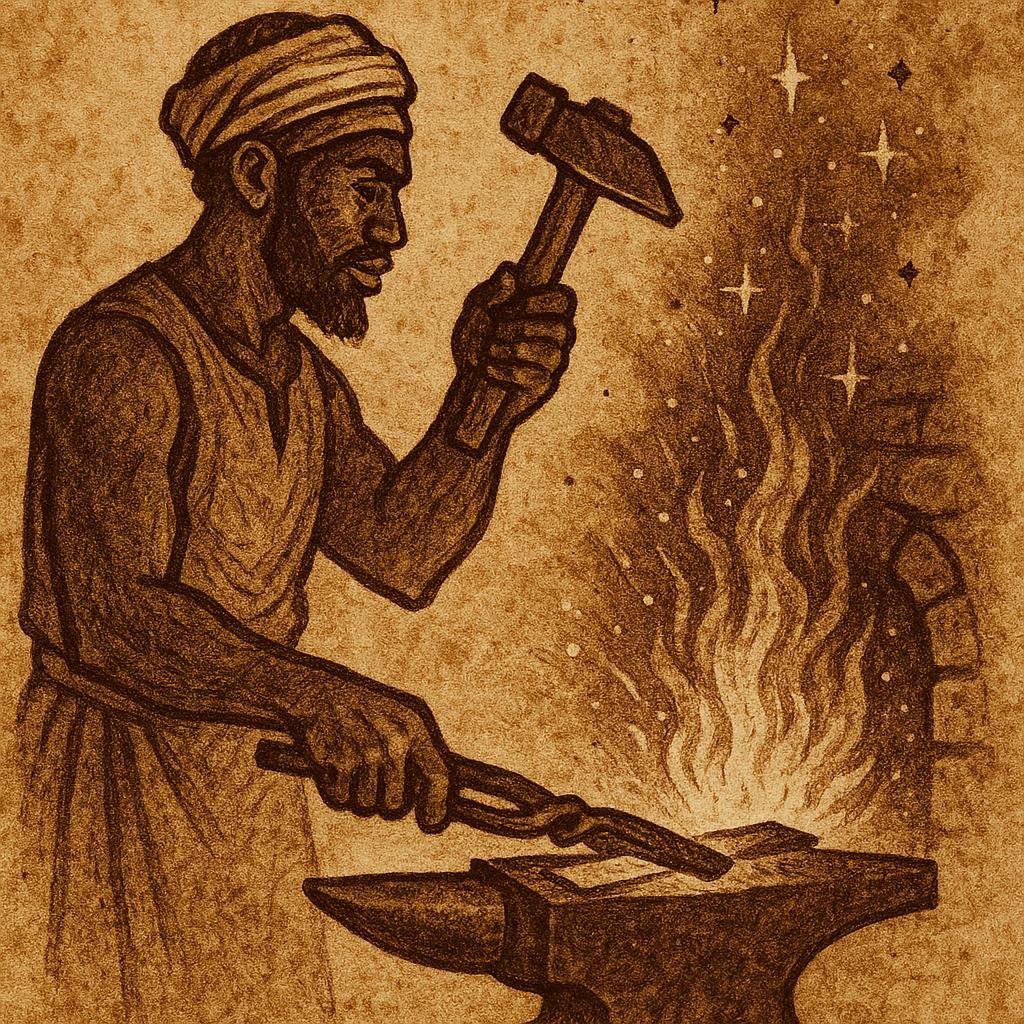In the ancient days of Mali, when the world was still new and the people were learning how to shape their lives, the blacksmith was unlike any other man. The Mandé people called him numu, the one chosen to work with metal and fire. While hunters roamed the forests and farmers tilled the soil, the blacksmith held a power that came not only from his skill but also from the gods themselves. For it was told that long ago, the gods descended from the heavens and placed in the hands of the blacksmith a gift that changed the destiny of humankind: the sacred fire.
This fire was no ordinary flame. It glowed with a light that seemed to hold the strength of the sun and the secrets of the earth. With it came knowledge that no other man possessed, the power to shape iron from stone, to bend it into tools that could cut, build, and protect. The gods said to the first blacksmith, “We give you this fire so that you may guide your people. You will be the bridge between us and them, for in fire there is creation and destruction, and in your hands lies the balance.”
The blacksmith accepted the gift with humility, for he understood its weight. Each time he struck his hammer against the anvil, sparks flew like stars, reminding him that his work connected heaven and earth. His forge became a sacred place where the spirit world whispered through the flames, and the sound of iron meeting iron was like a drumbeat of creation.
READ THIS:The River Spirit of the Niger
The people marveled at his power. With his tools, hunters made sharper spears, farmers tilled their land with stronger plows, and warriors carried blades that gave them courage in battle. But the blacksmith did not serve himself. His duty was to serve the community, to use the fire for balance and harmony, never for greed or pride. The elders often said that the blacksmith carried the spirit of both healer and judge, for the same fire that shaped tools could also destroy.
As the seasons passed, stories spread of the sacred fire. Children gathered at night to hear the griots tell how the gods chose the numu to hold knowledge no ordinary man could bear. Some whispered that when the blacksmith worked, he was not alone, that unseen spirits stood beside him, guiding his hands, watching that he never forgot his duty.
But one day, a young apprentice, eager for power, asked the blacksmith, “Why do you not keep the fire for yourself? With such strength, you could rule the people instead of serving them.”
The blacksmith looked into the boy’s eyes and then at the sacred flame, which flickered with unusual intensity. “You speak with arrogance,” he said. “The fire is not mine. It belongs to the gods, and I am only its guardian. If I used it for selfish gain, it would consume me and leave nothing but ashes.”
To show the boy the truth, he took a small piece of iron and placed it in the fire until it glowed red. “See how the fire makes the iron soft, ready to be shaped. But if I strike without wisdom, the iron will break, and the fire will be wasted. Power without purpose is destruction.” The apprentice bowed his head, realizing the weight of what he had nearly forgotten.
From then on, the lesson of the blacksmith was passed down: that sacred fire is both a gift and a burden, and those who carry knowledge must use it for the good of all. The Mandé people came to see the numu not just as a worker of iron but as a spiritual authority, a man who stood at the threshold between the human and divine.
Even today, among the Mandé, the blacksmith is honored as more than a craftsman. He is a keeper of secrets, a healer of wounds, a guardian of balance. When the hammer strikes the anvil, it is not just metal being shaped, it is the heartbeat of creation itself, echoing the gift of the gods.
Moral Lesson
The story of The Blacksmith and the Sacred Fire teaches that knowledge and power are sacred gifts that must be used with humility and responsibility. When wisdom guides action, creation flourishes, but when pride controls power, destruction follows.
Knowledge Check
What gift did the gods give to the first blacksmith in the story?
They gave him the sacred fire and the secret knowledge to shape metal.Why was the sacred fire different from ordinary flames?
It carried the strength of the sun and the secrets of the earth, symbolizing divine power and creation.How did the blacksmith use the sacred fire to help his people?
He created tools for farming, weapons for hunting and protection, and served as a bridge between the human and spiritual worlds.What warning did the blacksmith give his apprentice about misusing the fire?
He explained that selfish use of the fire would consume the user and turn power into destruction.Why were blacksmiths honored in Mandé society according to the tale?
They were seen as spiritual authorities who balanced creation and destruction, serving the community with sacred duty.What moral lesson does the story of The Blacksmith and the Sacred Fire teach?
That true power lies in wisdom, humility, and service, not in pride or selfishness.
Source: Mandé myth, Mali. Documented in oral traditions on the role of numu (blacksmiths) in society.

